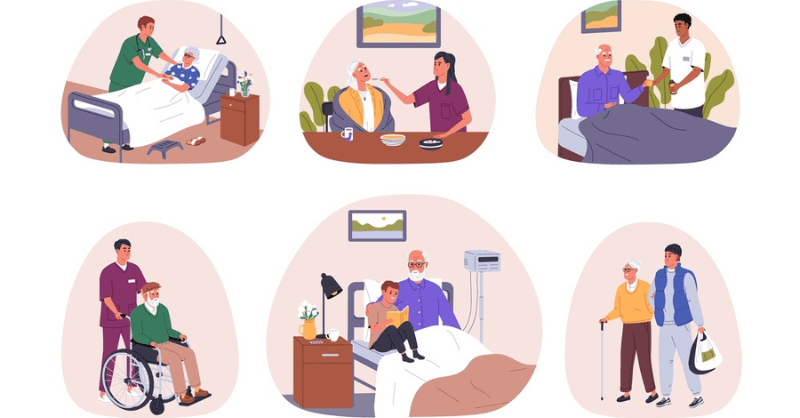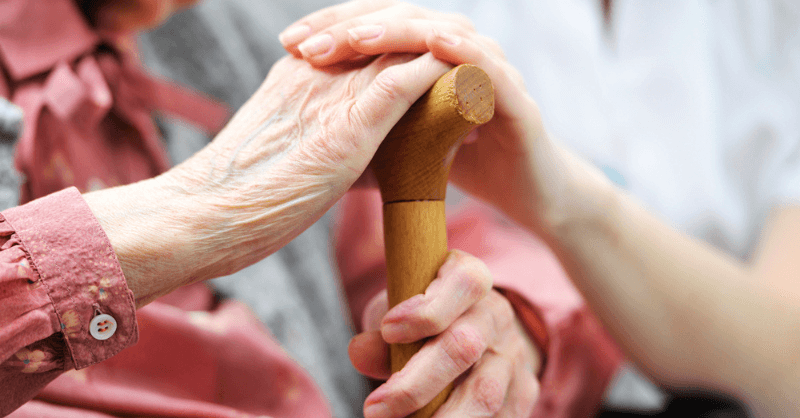

Care workers are lifelines for many. And a career in care can be life-changing – for both clients and care workers. So, if you want to play a vital role in other people’s lives, becoming a care worker might be your true calling.
Are ready to go above and beyond the call of duty to deliver extraordinary care to people in need? Learn everything necessary to become a care worker in the UK and more.
Table of Contents
What is a Care Worker?
A care worker is also known as a care assistant, support worker, or nursing home assistant. A care worker helps vulnerable people manage their daily activities and lead their lives as independently as possible.
As a care worker, you can expect your work environment to be physically and emotionally demanding. You can work at an adult care home, a client’s home or even stay overnight at people’s homes. And you’ll usually be required to wear a uniform.
What are the Main Duties and Responsibilities
of a Care Worker?
What does a Care Worker do? As a care worker, the day-to-day tasks you’ll do in this role will depend on the needs of the person you will be caring for. So, it might vary a lot from job to job.

But here are a few responsibilities you can expect to do if you’re helping someone at home.
Understanding Your Role in Care can help you better prepare for your role as a care worker.
You may need to pass enhanced background checks before you can work as a care worker in the UK.
- Career Tip
How Much Does a Care Worker Earn in the UK?
Generally, a care worker can earn up to £37,500 a year on average when they are experienced. But as a starter, it can be £21,000 and upwards, depending on your skill set. The average hourly rate is £12.06 for a care worker in the UK.
The differences are because many care homes are operated privately and can offer very different rates of pay. Also, the salary expectations may vary based on the level of experience, education, geographical location and employer. But in the NHS, all staff are paid within transparent bandings.
What Skills and Qualities does a Care Worker Need?
The skills and qualities needed for care work are varied, but these skills allow carers to deliver fantastic support to their clients. But what kind of person should become a carer or care worker?
The following skills needed for a care worker are not exhaustive. Instead, care workers’ unique skills and qualities improve the service users’ quality of life.
Passion
Passion is at the core of the role of a care worker. Being a carer is not just a job. It provides an unequalled opportunity to help others and positively impact other people’s lives. Therefore, being passionate about your work is crucial as a care worker.
Carers have a deep impact on the lives of their clients. Usually, people who provide care are expected to be passionate individuals with a genuine desire to improve the lives of others. You must be in tune with your service user’s well-being and provide care with dignity in all situations.

Dedication
Care work can be quite challenging at times. Handling complex issues or managing people who are uncooperative requires a dedicated care worker. And it’s needed to bounce back after a tough day at work and continue their work.
Moreover, this work is viewed as more of a calling than a job. Family members, friends and relatives look up to them in times of need. So, dedication is paramount in this profession.
Friendliness
To help people with behavioural problems or who are withdrawn, a friendly presence is pivotal. It makes them feel at ease, happy and safe. Also, it helps them build rapport with clients and develop better, long-lasting relationships.
Care workers are part of their client’s everyday life, and they often support the same people for a long period. So, being friendly and providing companionship is massively valuable to the lives of those they support in more than one way.
Empathy
Empathy is essential to care work. And good carers can imagine themselves in other people’s shoes and treat them with the compassion they deserve. They must have the ability to understand how the people they support and their loved ones feel. And it also helps if they can emotionally connect to them.
People who need care might be distraught due to their situation or have specific needs. That’s why it’s essential that a care worker is empathetic and constantly strive to understand how others feel. Empathy is one of the qualities that make a carer’s work so outstanding!

Flexibility and Resilience
In care work, every day is different. And many people love this aspect of their work. But this also means meeting the specific needs of every client. Accommodating these needs means on many days your work won’t end at 5. Sometimes you’ll need to stay late or help them in the middle of the night.
In care work, you have to be flexible in your approach to help clients maintain a good quality of life and provide consistent and good care. And resilience is also vital because the care work doesn’t always go as planned.
Communication
Communication is critical to provide quality, patient-centric care with the utmost care. As a care worker, you will be required to work with or for people from different backgrounds. You’ll have to adjust your communication methods based on the service user’s ability. Good communication skills also help ensure a standardised level of care.
Read more: 3 Must Have Communication Skills For Health And Social Care
As a care worker, your ability to provide companionship and needs-related support also require good communication skills. You must have good listening skills to acknowledge, understand and respect your client’s opinions. And excellent English speaking and writing skills are crucial as you have to accompany them to doctors’ appointments.
Organisation & Planning
You might have to work from your client’s home as a care worker, especially if you want to work as a live-in carer. So you will be responsible for maintaining certain aspects of your client’s home. For example, you might need to prepare and cook nutritious meals for them, do household chores, pay bills, post letters, or help your client attend activities.
Empowering your client is important. It allows them to remain independent while meeting their needs. But it’ll be up to you to keep the household running smoothly. You’ll need to oversee specific tasks, schedule, plan and prepare for them.
You also need to be proficient in Care Planning and Record Keeping: Health & Safety.
Patience
Care work can be pretty frustrating and stressful. That’s why the ability to handle situations calmly is crucial.
With busy, stretched-out schedules and juggling various time-sensitive tasks, providing quality care is nearly impossible without patience. The ability to handle pressure and remain calm during stressful situations is a prerequisite for a good care worker.
Reliability

A care worker’s reliability and dependability are significant factors. Care workers are lifelines for many clients as they depend on them for vital care. They often rely on care workers for basic daily life activities to much-needed social interaction. So, it’s important that care workers are reliable and responsible.
Critical Thinking
Providing care is complex because of this job’s ever-changing demands and problems encountered. Having critical thinking ability is essential to resolve issues and providing care.
Taking care of someone with critical conditions means the care worker has to be vigilant about changes in clients’ potential health complications. Also, routine risk assessments and immediate problem-solving in time-sensitive matters ensure they can deliver proper care.
Stress Management
Care workers are always under a lot of pressure and stress due to the nature of work. It can easily lead to burnout without proper stress management. While many people thrive under pressure, long-term exposure to stress can result in demotivation and aversion to work. This will hamper their quality of work and patient’s care.
Read more about work related stress management:
What is Moving and Handling in Health and Social Care?
So, care workers must have good stress management practices and know how to distance themselves from work when necessary. And their mental health must be a priority.
Check out this video on ‘A day in the life of a Home Care Worker’ and think if you have what it takes to make an impact in other people’s lives.
The practical skills required of a care worker can be taught and practised. But soft skills are just as important. It’s the people skills that make care workers so outstanding in their role.
What Qualifications do You Need to be a
Care Worker?
What qualifications do you need to be a care worker in the UK? There are no specific entry requirements. But usually, the minimum educational requirements are General Certificates of Secondary Education (GCSEs). You’ll find more details about this later on ‘How to Become a Care Worker in the UK?’
A university degree is not always required. However, courses such as Care Assistant/Support Worker or Health and Social Care will be useful. Having an intermediate apprenticeship or advanced apprenticeship may also be required. Also, the hiring company can also have other training requirements.
→ Accredited by CPD
→ Self paced learning
→ Instant FREE certificate upon completion
→ Developed by qualified health and social care professionals
→ Unlimited FREE retake
Do You Need Experience to be a Care Worker?
To become a care worker, it’s great to have previous experience. But it’s not always necessary.
Typically, having experience helps you be more qualified for such as position. And if you have previous experience working in home care, hospice, hospital or charity, you’ll find it easier to get jobs as a care worker.
Also, you can gain experience by caring for a family member or relative and through apprenticeships and volunteer work.
How to Become a Care Worker in the UK?
If you’re wondering ‘how do I become a carer in the UK’, there are many ways to become a care worker. For instance, you can become a care worker through the following-
- College course
- Apprenticeship
- Volunteering
- Applying directly
But how do you start? Keep reading to find out.
Consider if this Career is Right for You
It might help to be physically fit as you might need to help move or lift people.
- Career Tip
Find Your Niche
If you find this is the right path for you, you need to find your niche. There are various types of care workers, with each sector having different responsibilities.
For example, you can find work in the following care sectors – adult, disability, elderly, home, private, and support. Some of these may require specific qualifications and certifications. And some might need specific work experience.
Finding the niche you want will help you explore more and find out what each job requires. Then you will be able to prepare yourself accordingly.

College
A college course can be helpful when you look for work as a care worker. For instance, you can take a:
What are the Entry Requirements for College?
For a college course, you’ll usually need the following:
Apprenticeship
You can also become a care worker by taking on an apprenticeship. It can be an intermediate apprenticeship or an advanced apprenticeship.
What are the Entry Requirements for Apprenticeship?
There are no entry requirements for an apprenticeship. But it will help if you have –
- For an intermediate apprenticeship – some GCSEs, usually including English and maths, or equivalent
- For an advanced apprenticeship – 5 GCSEs in grades 9 to 4 (A* to C), or equivalent, including English and maths
Volunteering
Direct Application
You can also apply directly for care jobs and get training on the job. And it’ll be helpful to have experience supporting or assisting people. However, some employers may want you to have GCSEs in English and maths in grades 9 to 4 (A* to C) or equivalent.
If you spend time caring for someone you know, it also counts as having experience in a caring role.
- Career Tip
What Career Progression Opportunities are Available for Care Workers?
As a care worker, you can look for progression within this role and find similar or better opportunities.
You can develop your skills by taking courses in specific areas, like autism awareness, communication skills etc. And over time, after gaining experience, you could become a lead care worker. Or you could move into more senior jobs with further qualifications.
Advantages and Disadvantages of Being a
Care Worker
Everything has pros and cons. The same goes for the job of a care worker.
What are the Advantages of Being a Care Worker?
The work of a care worker is more of a calling than a profession you choose. People go into this line of work because of the advantages they receive. Some of them are given below.
Opportunity to Help People

Care work provides a good opportunity to help people – to help them with daily needs, empower them and lead a better life. Despite their hard work, they get immense pleasure in serving humanity. It’s clear that they are making a difference in other people’s lives, increasing their motivation.
Stimulating Work Environment
Every day of the week might not look the same for a care worker. Some days they experience a fast-paced workday, and some days it’s just routine work. The constant possibility of a changing environment is stimulating for many care workers.
Flexible Working Hours
Care sector often comes with flexible hours. Depending on client needs and the organisation you work for, you can choose your shifts. You can work on evenings or weekends on shifts.
Training and Development Opportunities
Along with qualifications, you’ll receive on-the-job training to improve your skills. This job has many opportunities for training and development for a care worker.
Having a driving licence might be helpful. Especially for working in shifts when you cannot get public transport.
- Career Tip
What are the Challenges of Being a Care Worker?

As fulfilling as care work is, it also has its challenges, such as –
Summary
How to become a care worker in the UK? You’ll need to have a certain skill set to be a care worker. You can get into this profession with qualifications and experience. Having both is ideal and quite helpful.
But you can choose your own path. If you think this is the right career for you, you can acquire qualifications and train as a care worker. For instance, you can take this Care Assistant/Support Worker course online. Or you can gain relevant experience and learn on the job. It’s up to you, and you have to decide based on your situation and opportunities.
→ Accredited by CPD
→ Self paced learning
→ Instant FREE certificate upon completion
→ Developed by qualified health and social care professionals
→ Unlimited FREE retake
FAQ(s) on Care Worker
Here are a few other questions you might have regarding ‘ how to become a care worker in the UK’
A care worker, often referred to as a carer or support worker, provides help and support to people with disabilities, illnesses, or those who are elderly. Their role can involve assisting with daily tasks, personal care, and sometimes medical support.
As a care worker, you can work in a care home, in your client’s private residence or the community. Regardless of where you work, the primary responsibilities are pretty similar – provide physical care and emotional support and assist them with a range of needs.
While it's possible to start as a care worker without formal qualifications, many employers prefer candidates to have a basic understanding of care principles. This can be achieved through courses like the Level 2 or 3 Diploma in Health and Social Care.
It is possible to be a carer or care worker with no qualifications. But you will need to possess certain skills and have relevant experience.
And having qualifications will facilitate future progression and give you better job prospects. Also, it will help you do your job more efficiently and provide higher-quality care.
What are the top caring qualities or characteristics that make a successful care worker? Some of them include being respectful, empathetic, reliable, patient, practical, observant and having resilience and a caring nature.
Volunteering is a great way to gain experience. Many charities and care homes welcome volunteers. This not only provides you with hands-on experience but also demonstrates your commitment to potential employers.
Hours can vary widely depending on the employer and the setting. Some care workers work regular office hours, while others, especially in residential settings, might work shifts, including nights and weekends.
Job vacancies can be found on the NHS jobs website, local council websites, job boards, and through recruitment agencies specializing in health and social care roles.
Yes, but you'll need to have the right to work in the UK. Depending on your nationality and the UK's current immigration rules, this might involve obtaining a specific visa or work permit.
Yes, anyone working in a care setting in the UK will typically need to undergo a Disclosure and Barring Service (DBS) check to ensure they are suitable to work with vulnerable individuals.
Salaries for care workers can vary based on location, qualifications, and experience. In the UK, care workers earn an average annual salary of £23,510 or £12.06 hourly. Those just starting out can expect around £21,190 annually, whereas experienced professionals might earn as much as £37,425 a year. Senior or specialist roles can command even higher salaries.
Many employers offer benefits such as pension schemes, paid holidays, and bonuses. Some also provide allowances for unsocial hours (like night shifts or weekend work) or offer overtime pay.
The role can be incredibly fulfilling, offering a chance to make a real difference in someone's life. Many care workers also appreciate the strong bonds they form with those they care for and their families. Additionally, the care industry offers numerous opportunities for professional development and career progression.
Absolutely. Many employers encourage continuous professional development and may offer training opportunities or financial support for courses. This can range from specialist care training to more advanced qualifications in health and social care.
The care industry is one of the sectors with a consistent demand for care workers. As the UK's population ages, the need for care workers is expected to increase, making it a relatively stable field in terms of job opportunities.
Yes, many employers offer both full-time and part-time positions. There are also opportunities for temporary or contract work, which can provide more flexibility.
While the role can be incredibly rewarding, it can also be emotionally taxing. Care workers often build close relationships with those they care for, and dealing with illness, decline, or death can be challenging. It's essential to have a support system and to seek professional guidance if needed.
Read More Articles on Health and Social Care
Health & Social Care UK Standards: 5 in 1 Career Bundle
5 in 1 Career Bundle
CPD Accredited┃FREE Certificate
→ Diploma in Health and Social Care
→ End of Life Care
→ Adult Social Care
→ Mental Health Awareness Training
→ Safeguarding Vulnerable Adults Training
- Available Courses
- Career Bundles80
- Animal care6
- Law8
- Quality Licence Scheme Endorsed111
- Teaching13
- Teaching & Academics Primary26
- Accounting & Finance Primary34
- Training3
- Design15
- IT & Software158
- Healthcare129
- Marketing32
- Health and Safety417
- Construction50
- Electronics25
- Hospitality22
- Health and Social Care237
- Child Psychology37
- Management383
- Business Skills274
- First Aid70
- Employability268
- Safeguarding76
- Food Hygiene105
- Personal Development1373
 Food Hygiene
Food Hygiene Health & Safety
Health & Safety Safeguarding
Safeguarding First Aid
First Aid Business Skills
Business Skills Personal Development
Personal Development












